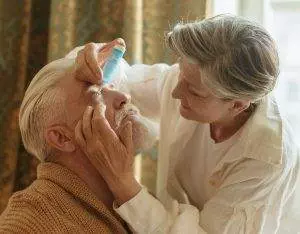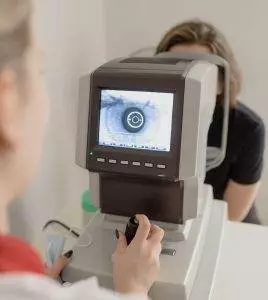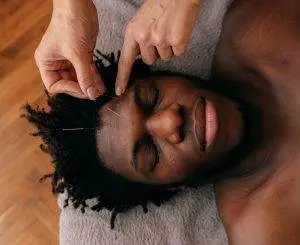By Qineng Tan, L.Ac., Ph.D. & Xiaomei Cai, L.Ac., Ph.D.

Dry eyes, blurred vision, or a headache behind eyes? Eye pain, redness, or pressure behind eye should not be ignored, as these symptoms may be a sign of deeper issues. Acupuncture and TCM offer an effective and holistic way to treat glaucoma, eye pain and headache, dry eye syndrome, and blurry vision in one eye or both eyes.
As a delicate organ that holds itself together in an orb shape, the eye requires the right amount of fluid to maintain tension and to keep its surface moist. Many eye problems are related to the balance, or imbalance, of fluids in and around the eyeball. Tears keep the eyeball lubricated, while a liquid called aqueous humor keeps the eyeball inflated. When there is not enough fluid, or when the fluid doesn’t drain properly and builds up in the eye, it can lead to eye disorders like dry eye and glaucoma.
TCM treatment for eye disorders work well as an alternative or adjunct to standard treatments for glaucoma or dry eye disease, as they focus on addressing the internal, root causes of these common eye issues.
What Causes Dry Eyes?
One of the most common eye problems is dry eye disease, which happens when you don’t produce enough tears, or if the tears you do produce don’t lubricate the eyes enough. Tears are made up of water, oil, and mucus. If the glands that produce tears are not functioning correctly, and/or the balance of water, oil, and mucus is not right, the tears may not protect the surface of the eyeball the way they’re supposed to.
The symptoms of dry eye syndrome include:
- Burning eyes, stinging eyes
- Thick, stringy mucus in the eyes or around the eye
- Extra sensitivity to light
- Red eyes, eye redness
- Watery eyes, watering eyes as reaction to dryness
- Eyes itching, rubbing eyes, feeling like there is something gritty or sand in your eye
- Blurred vision, blurry eyes, blurry vision in one eye, sudden blurry vision
- Eye fatigue, eyes tired when reading or looking at screens, eyelids feel heavy
- Difficulty driving at night
- Difficulty wearing contacts

Dry eyes can be caused by many different factors, from weather, environment, or humidity levels in your home or office, to allergies, hormones, medications like antihistamines, decongestants, birth control pills, antidepressants, and medications prescribed for high blood pressure and Parkinson’s disease. Some people may have dry eye after having LASIK eye surgery, or because of wearing contacts, or staring too long at their computer. Some health conditions that put you at higher risk for dry eye syndrome include: rheumatoid arthritis, ALS, lupus, and hyperthyroidism. Dry eyes can become inflamed, and make you more susceptible to infections. Over time, dry eye syndrome can lead to scarring of the cornea, which can permanently affect vision.
The typical treatment most people try for dry eye syndrome is the use of over the counter eye drops or artificial tears. There are various types of prescription medications that also aim to replace or increase the production of tears. Some doctors may recommend antibiotics to help reduce inflammation around the tear ducts, or special contact lenses that are designed to keep moisture on the surface of the eye. But none of these solutions treats the underlying cause of dry eyes.
Acupuncture has been shown to boost the efficacy of standard treatment for dry eyes by helping promote more tear secretion and improving the makeup of the tears themselves, so that they don’t evaporate so easily.
What Is Glaucoma?
Glaucoma is an umbrella term for vision loss related to damage to the optic nerve. This often happens because of a buildup of too much fluid in the eye, which creates pressure. Often, a person has already had glaucoma for a long time before they begin to notice changes in their vision. The most common types of glaucoma do not cause eye pain but can cause loss of vision, usually beginning with peripheral vision.
Glaucoma is one of the top causes of blindness worldwide, and can begin at any time in life. African Americans have a much higher risk of developing glaucoma. Other people at higher risk for glaucoma include people over 60, people who have diabetes, and people who are already very near-sighted.

The most common type of glaucoma is primary open-angle glaucoma (POAG), which is diagnosed when an eye examination finds damage to the optic nerve or retinal nerves. Most people with POAG demonstrate some level of elevated intraocular pressure, but some do not. Most types of treatment for glaucoma are focused on reducing this eye pressure, as it is one known factor. However, medical science is still unclear about exactly what causes glaucoma.
Medications to treat glaucoma try to remove the excess pressure built up in the eye by either increasing the flow of fluid out of the eye, or by decreasing the production of fluid within the eye. Combination medications do both. These medications may or may not be helpful for individual patients. For some people, they cause irritation or dry eyes (see above). They require frequent usage and can be expensive. Laser surgery is another alternative, but many patients begin having problems with eye pressure again after some time has passed.
Acupuncture treatment can improve blood flow to the eye and to the optic nerve, which can in turn help to reduce pressure behind the eye.
Acupuncture: A Natural Treatment for Dry Eye and Glaucoma
According to TCM, many eye disorders reflect other problems going on internally, dimming the life force energy that lights up the eyes. From the TCM point of view, eye problems like glaucoma and dry eye syndrome are due to lack of proper flow of energy, blood, and nourishment to the eyes.
In TCM, the liver is considered the storehouse and distributor of blood and other bodily fluids. If there is inadequate production of tears in the eyes, that is considered to be a reflection of some weakness or blockage coming from the liver system. The liver also contains the “spark of life” that shines out through the eyes. So, when there is not enough blood and Qi flowing from the liver to the eyes, there may be dryness and blurred vision. When there is too much fire energy coming from the liver, it can cause swelling that leads to pressure. This is what can cause the eye pressure of glaucoma, and also eye pain, or headache behind the eye.
Research has shown that acupuncture treatment can be effective for helping both glaucoma and dry eye syndrome:

- One study of patients treated for glaucoma showed reduced intraocular pressure both an hour after the treatment, and more generally, after having completed four treatment sessions.
- An analysis of studies showed that patients treated with acupuncture for glaucoma showed improved vision over those who did not.
- Another study showed that acupuncture treatment for glaucoma improved blood flow to the eye.
- A study done at the University of Pittsburgh compared patients treated with acupuncture for dry eye to those given “sham” acupuncture treatments over a six month period. Participants who had acupuncture reported improvement in symptoms of dry eye, such as less scratchiness and less redness. The results were still improved months after the treatment.
- A study that compared patients who received acupuncture treatment and used artificial tears to those who only used artificial tears found that the acupuncture recipients produced more natural tears of good quality, and experienced fewer symptoms of dryness.
Acupuncture Near Me for Glaucoma and Other Eye Disorders – Los Angeles Area
TCM has recognized and treated eye disorders for many centuries. Symptoms of dryness, itching, eye fatigue, pressure or headache behind eyes, and sore eyes can all be treated with acupuncture and herbs. Some changes in habits and nutrition will go even further to help people with glaucoma or dry eyes find relief. The doctors at Art of Wellness have over 35 years of experience in helping people get relief from dry eyes, restoring clearer vision, and bringing back the vibrant Qi that lights up your eyes.
*This article is for education from the perspective of Traditional Chinese Medicine only. The education provided by this article is not approved by FDA to diagnose, prevent, treat and cure human diseases. It should not stop you from consulting with your physician for your medical conditions. Traditional Chinese Medicine is based on Qi, which is an invisible force that usually cannot be observed by modern science. Because science focuses on testing ideas about the natural world with evidence obtained through observation, these aspects of acupuncture can’t be studied by science. Therefore acupuncture and Chinese herbs are often not supported by double-blind, randomized trials, and they are considered alternative medicine therapies in the United States.
